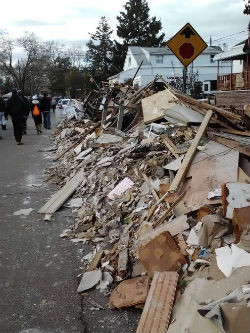Invading the Pain
Even before Superstorm Sandy slammed into the East Coast last October, the EFCA was on high-alert: consulting with the superintendent of the Eastern District. As meterologists predicted damage, EFCA ReachGlobal—with its experience in crisis response—was also passing on vital preparedness information for area churches.
Then, after the storm hit, ReachGlobal staff members began calling pastors to see how they had fared and to find out the needs of their congregations and their communities.
ReachGlobal is committed to ministry occurring through the local church. The results sought and measured are those of transformed lives, communities and churches that, in turn, transform others.
Over the last few years, ReachGlobal has partnered with local churches to respond to domestic crises ranging from hurricanes, tornadoes and floods, to fires and even drought. Internationally, the ministry has worked through national partners addressing similar crises in 15 different countries (and was engaged in a total of 19 international and domestic locations in 2012 alone.)
In almost all cases, our partners launched initial relief efforts and continued demonstrating God’s love long after most first responders had left.
Why we respond
Wherever and whatever the tragedy, the season of disruption afterward is a time when people ask hard questions about life and its meaning. It is the perfect time to invade the pain with a purpose. The stressful physical, emotional and spiritual needs tenderize hearts to hear the gospel and to accept loving help.

ReachGlobal staff members involved in crisis response believe that “loving your neighbor as yourself” intersects with “going and making disciples.” As a result, the ministry’s primary value is to help the local church build deeper relationships that will, over time, translate into new churches.
Seven years after Hurricane Katrina hit New Orleans, for example, homes continue to need rebuilding. The act of helping to rebuild homes offers relational access for long periods of time with families and with neighborhoods.
In some areas of the world where the Evangelical Free Church has no presence, ReachGlobal has purchased supplies for like-minded national partners to distribute in the name of Jesus. New churches are now in place as a result of these efforts.
ReachGlobal is always looking for local church partners poised to respond to disasters. “Partnership multiplies kingdom resources,” says the ministry’s crisis-response director, Mark Lewis. “‘Two are better than one, because they have a good return for their work’ (Ecclesiastes 4:9). Through interdependent relationship, crisis response adds wind to the sails of our ministry partners, leveraging the mutual investment for gospel advancement.”
How partnership works
Partnership means that ReachGlobal helps a church set up systems for a sustainable and missional response; communicates the need for donations and short-term teams to EFCs around the country; and then helps coordinate the response.

In the wake of Hurricane Sandy, ReachGlobal partnered with Beacon EFC in Galloway, N.J.— which experienced no damage—so that the church might significantly serve and influence southern New Jersey. Immediately following the storm, Beacon EFC sent its own teams into the community to help. And within two weeks, the church was hosting teams from around the country.
Beacon EFC also created “Hope Chest”—an outreach modeled after the ReachGlobal post-Katrina “free store.” With Hope Chest, people in the community can visit the church to obtain food, household items and baby supplies, as well as spiritual food. In essence, Beacon EFC has become a community gathering place.
In February, short-term crisis-response teams built a large barn behind the church, to store the equipment that Beacon EFC needs to continue its response and complete repairs to two nearby Evangelical Free Churches.
Beacon EFC’s relationship with ReachGlobal extends back several years, to when the church began sending volunteer teams to New Orleans for Hurricane Katrina cleanup. When Superstorm Sandy loomed on the horizon, Pastor Pete Nelson immediately thought of the crisis-response ministry.
“Our partnership has been a blessing,” Pete says. “Working through all the unforeseen ‘stuff’ is always a challenge, but having a ministry team that understands what it means to be flexible and adapt has made it a joy. [Partnership] has allowed us to have an impact on our community in a new and fresh way.”
While standing side-by-side in the rebuilding process after a tragedy, sometimes a conversation goes far deeper than damaged drywall. As that happens in Galloway, N.J., it’s Beacon EFC’s members who are there to build the long-term relationship.
In the same way, each partner church—in its own community, after its own devastation—is building the Church while it rebuilds homes, one family at a time.
Many churches send crisis-response teams to volunteer with ReachGlobal year after year. What about your church? In 2013, teams will be hosted in Haiti, New Jersey and New Orleans. Make contact by email, or visit the website to learn more. Being prepared is crucial. Take a free assessment of your church’s readiness to respond to a crisis and reach out in ministry.
Send a Response
Share your thoughts with the author.